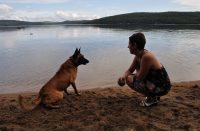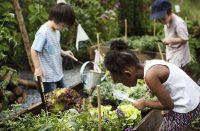The university experience can mean long hours in the lecture hall, but this doesn’t have to come at the expense of getting involved. Even those awkward two-hour breaks between classes provide enough time to explore environmental groups and activities. For those who long to make their mark, a smart place to start is right on campus.
The university experience can mean long hours in the lecture hall, but this doesn’t have to come at the expense of getting involved. Even those awkward two-hour breaks between classes provide enough time to explore environmental groups and activities. For those who long to make their mark, a smart place to start is right on campus.
In fact, a passion for the planet can lead to a world of opportunity, according to Justin Trudeau, Anjali Helferty, Thomas Roussin, Jamie Biggar and Zoë Caron. Although these inspiring young Canadians work in diverse areas, they speak in one voice when giving advice to environmental studies students: The classroom should be the first stop on campus, but definitely not the last.
IN THE INTERVIEWS THAT FOLLOW, these emerging national leaders share their thoughts on environmental education and turning extracurricular activities into valuable professional skills. They encourage students to get involved, because when we explore our interests, we often unearth our passions.
Anjali Helferty
National Co-ordinator, Sustainable Campuses
Sierra Youth Coalition, Ottawa
syc-cjs.org/sustainable
What is your advice to students who are about to start university?
AH There are different ways to learn on campus. Something will grab your attention and it will be all you want to do. So be open to finding that thing. Many people do not find their passion because they don’t realize it might not be
What kept you up until 3am?
AH When I was at Queen’s, I volunteered for a couple of years on the Sierra Youth Coalition’s volunteer project committee. Then I graduated and have been National Co-ordinator of Sustainable Campuses since 2006. My passion has turned into a real, full-time job.
How did your education prepare you for your job?
AH I have a degree in environmental chemistry. It’s good to have the science background when we’re talking about climate change, but it was really the student government experience that gave me the skills to enable me to get and do this job. My degree matches the field I’m in, but in terms of day-to-day learning, it all happened outside the classroom.
How does the Sustainable Campuses program work?
AH The backbone is the Campus Sustainability Assessment Framework, our holistic campus assessment, which involves 10 sections: five about people systems and five about ecosystems. There are 169 indicators. For example, the percentage of faculty who have disabilities compared to the national average, or amount of water use per member. Each campus is different. Some do it in pieces and a few have done the whole thing. We have 66 colleges and universities involved, and 25 to 30 schools that are really active.
What can students accomplish with this framework?
AH The goal of the program is to have a decision-making process that is sustainable and not just about money or the reputation of the school, although those do come into play. Students usually have time to do the research groundwork, but they can’t make change with the research alone. We strongly support a multistakeholder component with staff and administrative support. When students get the buy-in from those groups, then they have decision-making power.
What have you learned since the program started?
AH The meaning of sustainability has changed on campuses since 2003, when the assessment was first created out of someone’s master’s thesis. So this past year we updated it. It is a living document and will change as the meaning of sustainability changes. Right now, the social justice aspect is more often included.
What role can students play in greening their campus?
AH Students are key stakeholders because they are driven. They are only on campus for a short time and going through a big transition while they are there. So students are more willing to try new things and push for change in creative ways. Students drive a campaign and bring to it a sense of urgency. The spirit, heart and soul of any campus project are in the students.
Where is the best place to start?
AH Student unions can make their own services more sustainable, like their pub, their coffee house, even using double-sided paper all the time, or maybe opening a sustainability office on campus. A sustainable student union is a huge leveraging tool that enables students to look to the administration and say, “Look what we’re doing. We can help you do the same.
Justin Trudeau
MA Candidate in Environmental Geography, McGill University
Former teacher and former chair of Katimavik, a Canadian national youth volunteer-service program
Holds the Liberal nomination in the federal riding of Papineau
Why did you first become a teacher?
JT The model of a teacher is what I consider to be the path of my life. A teacher isn’t someone who knows all the answers, it’s someone who helps you ask the questions that get to the answers.
What are your words of advice to students?
JT Don’t give up. Get involved. No matter how small it seems right now. Pick a small task that you can achieve and just do it. Don’t start with “We’ve got to fix the world.” Start with “What can I tweak in my immediate environment with the resources I have?” That’s the only thing we have to ask ourselves.
Where should young activists focus their attention?
JT Right now, we desperately need to get young people connected with their communities. The world needs to change. We need to shift our practices and habits. We need to re-question our basic assumptions: how we run our society, how we make a successful world, and how we measure a successful world. There’s a new drive in terms of the environment, and I think it’s an issue whose time has come. Canadians are relying more and more on an image of Canada that isn’t actually out there, so there needs to be a shift by consumers and business and government. The fact is, there is so much money to be made in a green economy, in being smarter, in being cutting edge. It’s the young people who need to speak up more clearly.
Zoë Caron
Atlantic Co-ordinator, Sustainable Campuses (2005-2007)
Co-ordinator, SustainDal, Dalhousie University
Halifax, Nova Scotia
What strengths do students have on campus?
ZC Students are the citizens of the university and need to flex their citizenship. They also have so much passion and energy. Often they devote it purely to class work. Often people look ahead and think, okay, I’ll follow my passion later in life, when I graduate, when my career is established. But I think individuals need to act now, wherever they are in life. Look around and work with whoever is in the community around you. In Canada especially, it’s so easy to make change if you just really go for it.
Does your class work relate to your extracurricular activities?
ZC When I started to get involved with campus sustainability groups, there was an immediate link between my schooling and the workplace. It was like doing a class and a co-op term at the same time. For example, I’m co-writing Global Warming for Dummies [with Elizabeth May]. So I structured one of my independent course projects around researching climate change for the book. That’s just in my personality. I want to do everything so I find ways to integrate my interests. It’s how I fit it all in and find time to play.
Why should students consider an environmental education?
ZC People have a huge amount of respect for those who do environmental work. Now there are lots of jobs that were never before directly affiliated with the environment, like engineering, business management or law. The environment relates to everything.
What’s your biggest accomplishment on campus?
ZC University just got a sustainability office, with both administrative and student co-ordinators. Now there will always be someone to lead campus initiatives. The office is important because it institutionalizes environmental, social and economic changes towards sustainability. Students formed an environmental group 10 years ago, but the interest comes and goes as volunteers graduate and move on. With so much turnover the university needs a core. People take the issue of sustainability more seriously when they see someone getting paid to do it.
Jamie Biggar
MA in Environmental Studies
Common Energy
University of Victoria, BC
What’s the best part of environmental studies?
JB Environmental studies is inherently interdisciplinary. It’s also humbling because it makes you appreciate the limits of your knowledge, and it’s empowering because once you get over that it gives you the tools to approach complex issues.
Does classroom work relate to out-of-classroom work?
JB One student I know, she is a super organizer, and she finds it difficult to motivate herself to go to class because she’s so excited by her extracurricular work. It’s so easy to take school for granted, but in class you learn how to learn. The content of courses is not as important as learning to think, research and communicate. Studying large, abstract problems is an opportunity to practice how to think things through. Then you can take the big picture from class and apply it to everyday situations through your activism.
Should students get involved in activism?
JB For one, students have the opportunity to be great activists, and this world needs their energy and insight now more than ever. But the world isn’t the only one that benefits. There are soft and hard skills you learn as an activist out there doing projects and campaigns. By volunteering you can take on responsibility that you’d never get the opportunity to do in government or the private sector. All it takes is interest and some hard work to get a group to trust you with important work in areas like strategy, communications and finance that will be useful for most people for the rest of their lives. The most important thing is learning how to work with people, create teams and make hard decisions together.
What is the biggest challenge in campus activism?
JB A constant issue in student activism is the guaranteed turnover. People will graduate and can never leave all their knowledge behind for the next wave. If everyone from an organization leaves at the same time, the entire institutional memory of the organization can disappear with them. So we try to make room to integrate new people early on. You aren’t taught how to facilitate a meeting or run a campaign until you get involved and try to make change. There is huge growth and development that comes from being an activist, and you want to make sure that you are constantly teaching people as you learn.
Thomas Roussin
Vice President, Student Association
First Nations University of Canada
University of Regina, Saskatchewan
What strengths do students have on campus?
TR On our campus, the strength is the access to indigenous knowledge. We can learn the Latin names of plants or the English place names, but our history and culture really exist much earlier than that. At First Nations University we also learn the indigenous names, which come with old stories and timeless context. This is truly unique when studying within our environmental and health programs.
How does your class work relate to your extracurricular activities?
TR Indigenous knowledge teaches respect for the land and for each other as well as the interconnected nature of our ecosystem. You might take biology because you love nature, but the indigenous knowledge adds an emotional, spiritual and mental element to the science.
What is one piece of advice you could give to environmental studies students?
TR Often we look at indigenous peoples for help with the environmental crisis, but I don’t think we should be put up on a pedestal. We’re human like everyone else. Some of us drive big trucks to school and don’t care about the environment, others wear hemp and ride bikes. Indigenous communities have their specialists too. There is serious value in indigenous knowledge, which has been passed down through our most valuable teachers, the old people. Some of our Elders hold a wealth of knowledge and wisdom, and those messages need to be carried on. They can help us understand “the other” and the complexity of life. The old stories and knowledge systems are profoundly similar to science and its modern discoveries. Indigenous knowledge is ancient, tried and true, and has come about though extensive research.
What is one lesson that students learn from the Elders?
TR The medicine wheel is a blueprint for life. It has the four directions and symbolizes interconnectedness and infinity of our universe. It teaches balance, and it shows there’s more to nature than physical life. The first virtue is humility. We are nothing without our surroundings. Humility is only one of many virtues, but humility alone teaches us to watch and listen, something every person should consider seriously, especially students.
What is your biggest environmental accomplishment on campus?
TR Our biggest accomplishment on campus was the recycling bins. It sounds silly, but this is a big and important first step. We have to start somewhere, and recycling paper can be the first step in making people aware of their trash. Perhaps, in my opinion, the biggest initiative on campus has been the installation of the Native Prairie Area. Watching a biodiverse landscape thrive and endure throughout the summer with zero irrigation is a beautiful thing, especially when we spend thousands of litres of water keeping the other campus lawn lush and green. As well, we developed a medicine wheel garden, which has become home to many of our sacred plants. Ekosi.
What does Ekosi mean?
TR There is no word for good bye in Cree, so sometimes people just say “Ekosi” which means that’s it/that’s all.












